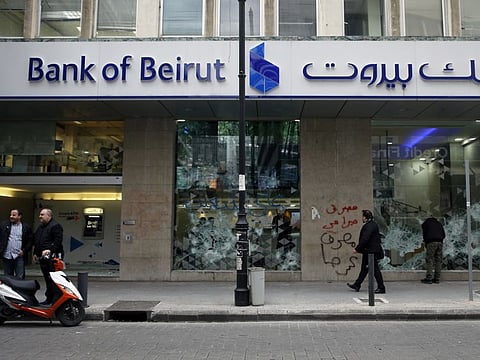The IMF route may be Lebanon’s last resort
Any bailout would be weighted with anti-corruption and austerity strings

Let’s be realistic! No matter how many deck chairs are shuffled in Lebanon’s cabinet or parliament, no matter how many enthusiastic shiny new faces enter the political sphere, only a superhuman could drag this ailing country out of its financial quagmire.
As long as Iran’s proxy Hezbollah remains Lebanon’s puppet master, the country’s traditional allies keep their distance along with investors and tourists. Hezbollah’s Secretary-General Hassan Nasrallah bills himself as a Lebanese patriot.
If that were true he should have released this tiny nation from his crippling restraints long ago instead of tightening the screws.
The new Hezbollah-backed government led by Hassan Diab was formed in response to months of good-natured street protests that ultimately turned violent.
Even supposing Prime Minister Diab engaged in preliminary talks with the IMF, his efforts would be stymied by Nasrallah who views the organisation as one of the West’s tools of manipulation and who has warned that IMF conditions would spark a revolution
Prime Minister Saad Hariri threw up his hands admitting he was out of solutions. His replacement sounded positive at first but now that he has seen the state of the party up close and personal his messages are sombre.
Not only has Diab admitted that up to 40 per cent of Lebanon’s population could soon be thrust into poverty thus dampening whatever remnants of enthusiasm remain, he has made the shocking announcement that for the first time ever his country will be a debt defaulter, in this case a US$1.2 Eurobond payment maturing on Monday will go unpaid.
“The debt has become larger than Lebanon can bear and bigger than the ability of the Lebanese to met interest payments,” he said. He plans to restructure outstanding debt but with the country’s credit rating heading for junk territory that may be easier said than done.
People’s fragile hopes that somehow the new government could lead them out of a darkening tunnel have been well and truly dashed.
The Lebanese are sick and tired of corrupt and incompetent political dinosaurs that have bled their nation of its resources for generations culminating in 48 per cent youth unemployment and massive inflation even as the rubbish piles up in the streets and the frequency of electricity and water cuts increase.
Unsustainable debts
Foreign debts have piled up and have now reached unsustainable levels. Today Lebanon’s debt to GDP ratio stands at 160 per cent, the world’s highest.
In recent months the value of the Lebanese pound has plummeted by 60 per cent incurring a run on the dollar which banks are now rationing to ensure the continuation of crucial imports. People’s savings have been depleted. The brightest and the best feel they have no other choice but to head for the door.
The International Monetary Fund (IMF) could be Lebanon’s saviour but there are no guarantees. Firstly, any bailout would be weighted with anti-corruption and austerity strings that would be a bitter pill to swallow for the political grafters and the struggling population alike. True, there is no gain without pain but how much further can Lebanese belts be tightened?
Greece is a case in point. IMF/EU imposed reforms linked to multiple loans caused the population extreme hardship in terms of company closures, lost jobs, homelessness, reduced welfare payments and pensions to the extent that many parents unable to feed their children rendered them to state care. Years of austerity has placed Greece on a steady, albeit fragile, economic path but at what cost.
Egyptian example
On the other hand, Egypt that accepted a US$12 billion IMF loan in 2016 has fared reasonably well but for a while it was touch and go due to the IMF’s stipulation that the pound be floated which lost over half its value against the US dollar almost overnight.
Inflation soared to 30 per cent. Prices shot up to unaffordable levels and to say Egyptians were not amused is an understatement. Nevertheless their patience has paid off. The currency has strengthened, inflation has been reduced to six per cent — and unemployment is down to an eight per cent low.
However, even supposing Prime Minister Diab engaged in preliminary talks with the IMF his efforts would be stymied by Nasrallah who views the organisation as one of the West’s tools of manipulation and who has warned that IMF conditions would spark a revolution. For its part the IMF will not negotiate with Hezbollah which the US and other nations has branded terrorist.
So where does Lebanon go from here when donor nations have fled fearing their funds will end up in Hezbollah’s pocket and now that the government has defaulted on a debt payment, lenders will be in very short supply?
There is no magic wand to solve this crisis and without Nasrallah’s willingness to loosen his fist the government is hamstrung. The IMF should not be shunned out of hand when with all its downsides it may be Lebanon’s last chance saloon.
— Linda S. Heard is an award-winning British political columnist and guest television commentator with a focus on the Middle East


